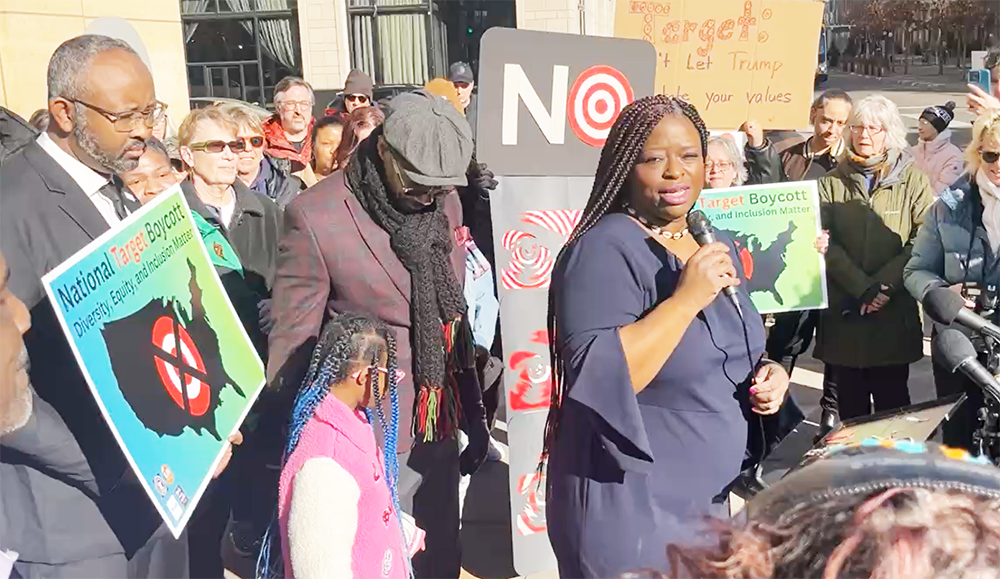
Rev. Jamal Bryant is urging Black Americans to keep the pressure on Target by continuing the national boycott that began as a 40-day economic “fast.” The move, sparked by the retail giant’s decision to end its diversity, equity, and inclusion (DEI) initiatives, has already cost the company an estimated $12 billion, Bryant said. “Because of your fast, Target has lost $12 billion,” Bryant told his congregation. “I am so grateful that there is power in unity, and we know the strength of Black economics.”
Since the fast began, Target’s stock has plummeted from $138 to $94 per share, and in-store foot traffic is down by 7.9%. The boycott gained traction after Target announced it would wind down racial equity programs it introduced following the 2020 police killing of George Floyd. The company, which operates nearly 2,000 stores and employs over 400,000 people, said it had always planned to sunset the programs after three years. However, many saw the decision as a retreat from commitments made to Black communities.
After meeting with Target executives, Bryant confirmed that the company agreed to just one of the boycott’s four major demands: fulfilling its $2 billion pledge to support Black businesses through product placement, services, and investments in Black-owned media. The company has yet to meet demands to deposit $250 million into Black-owned banks, reinstate DEI programs, or fund community pipeline centers at 10 HBCUs focused on teaching retail business. Bryant said Target’s response wasn’t enough. “Target cannot selectively decide which parts of our dignity they’re willing to honor,” he said.
A growing coalition of African American leaders and organizations—including the National Newspaper Publishers Association (NNPA)—has continued meeting to strategize further action. At the center of the discussion is the role of the Black Press, which Target has yet to acknowledge in a meaningful way, despite more than a year of outreach by the NNPA under President Dr. Benjamin F. Chavis Jr., with assistance from former U.S. Sen. Laphonza Butler.

Chavis stressed that any agreement with Target must include investment in Black-owned media, including outlets like BlackPressUSA.com, The Washington Informer, Philadelphia Tribune, and Chicago Defender. “The dissemination of this message and narrative is only accurately done by the Black Press in 2025 and beyond,” Chavis said.
For nearly 200 years, the Black Press has played a pivotal role in American life, particularly for African Americans. From its inception in 1827 with Freedom’s Journal, the Black Press has informed, educated, and empowered Black communities while countering the negative portrayals that dominate mainstream media. As documented by the Oxford Bibliographies, the Black Press has served as “agents of social change” and “defenders of shared values and interests.”
During Reconstruction and Jim Crow, Black journalists like Ida B. Wells used the press to expose racial violence and injustice. Wells’ work documenting lynchings and countering white supremacist propaganda laid the foundation for the Black Press to serve as a vital corrective force in American media. That legacy remains just as urgent today. Modern studies show that negative portrayals of Black people in media lead to harmful outcomes, from over-criminalization and over-sexualization to negative health effects and social exclusion. The Black Press continues to challenge that narrative.
Cheryl Smith, publisher of Texas Metro News and Garland Journal, said the importance of the Black Press cannot be overstated. “If we look back at every period in our lives since its inception, we can see how significant the Black Press was,” Smith said. “We need to see it and believe it every day we get up, and I promise you, we will be stronger, more vibrant, and more powerful people.”
The NNPA currently represents more than 200 Black-owned newspapers across the country, continuing a legacy that is nearly as old as the United States itself. As America nears its 249th birthday, the Black Press marks 198 years of continuous service. “The largest Black population in American history are now openly and unapologetically demanding freedom, justice, equality, democracy, and equity,” Chavis said. “And the only media institutions that have always stood with us are our own.”
As Bryant calls for continued boycott efforts, he and Chavis are reminding Black America that real leverage comes not only from what it refuses to accept—but also from what it insists on valuing. “We’ve seen what happens when we stand together,” Bryant said. “Now we keep standing.”
About Stacy M. Brown, NNPA Senior National Correspondent
Stacy M. Brown is Senior National Correrspondent for the National Newspaper Publishers Association's (NNPA) BlackPress USA. NNPA is the trade association of the more than 200 Black-owned community newspapers in America. He is the co-author of Blind Faith: The Miraculous Journey of Lula Hardaway and her son, Stevie Wonder (Simon & Schuster) and Michael Jackson: The Man Behind The Mask, An Insider's Account of the King of Pop (Select Books Publishing, Inc.)











